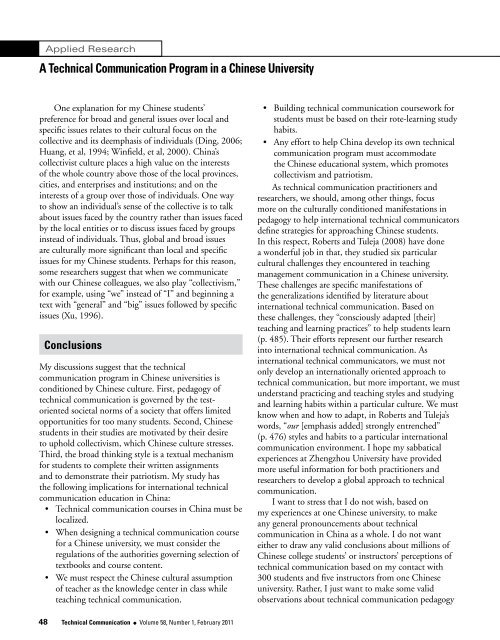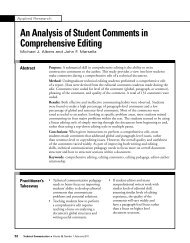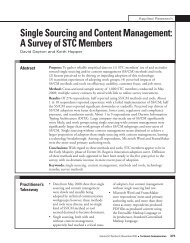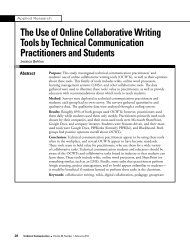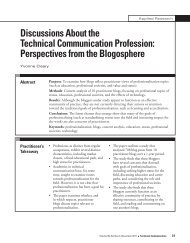When Traditional Chinese Culture Meets a Technical ...
When Traditional Chinese Culture Meets a Technical ...
When Traditional Chinese Culture Meets a Technical ...
You also want an ePaper? Increase the reach of your titles
YUMPU automatically turns print PDFs into web optimized ePapers that Google loves.
Applied ResearchA <strong>Technical</strong> Communication Program in a <strong>Chinese</strong> UniversityOne explanation for my <strong>Chinese</strong> students’preference for broad and general issues over local andspecific issues relates to their cultural focus on thecollective and its deemphasis of individuals (Ding, 2006;Huang, et al, 1994; Winfield, et al, 2000). China’scollectivist culture places a high value on the interestsof the whole country above those of the local provinces,cities, and enterprises and institutions; and on theinterests of a group over those of individuals. One wayto show an individual’s sense of the collective is to talkabout issues faced by the country rather than issues facedby the local entities or to discuss issues faced by groupsinstead of individuals. Thus, global and broad issuesare culturally more significant than local and specificissues for my <strong>Chinese</strong> students. Perhaps for this reason,some researchers suggest that when we communicatewith our <strong>Chinese</strong> colleagues, we also play “collectivism,”for example, using “we” instead of “I” and beginning atext with “general” and “big” issues followed by specificissues (Xu, 1996).ConclusionsMy discussions suggest that the technicalcommunication program in <strong>Chinese</strong> universities isconditioned by <strong>Chinese</strong> culture. First, pedagogy oftechnical communication is governed by the testorientedsocietal norms of a society that offers limitedopportunities for too many students. Second, <strong>Chinese</strong>students in their studies are motivated by their desireto uphold collectivism, which <strong>Chinese</strong> culture stresses.Third, the broad thinking style is a textual mechanismfor students to complete their written assignmentsand to demonstrate their patriotism. My study hasthe following implications for international technicalcommunication education in China:• <strong>Technical</strong> communication courses in China must belocalized.• <strong>When</strong> designing a technical communication coursefor a <strong>Chinese</strong> university, we must consider theregulations of the authorities governing selection oftextbooks and course content.• We must respect the <strong>Chinese</strong> cultural assumptionof teacher as the knowledge center in class whileteaching technical communication.• Building technical communication coursework forstudents must be based on their rote-learning studyhabits.• Any effort to help China develop its own technicalcommunication program must accommodatethe <strong>Chinese</strong> educational system, which promotescollectivism and patriotism.As technical communication practitioners andresearchers, we should, among other things, focusmore on the culturally conditioned manifestations inpedagogy to help international technical communicatorsdefine strategies for approaching <strong>Chinese</strong> students.In this respect, Roberts and Tuleja (2008) have donea wonderful job in that, they studied six particularcultural challenges they encountered in teachingmanagement communication in a <strong>Chinese</strong> university.These challenges are specific manifestations ofthe generalizations identified by literature aboutinternational technical communication. Based onthese challenges, they “consciously adapted [their]teaching and learning practices” to help students learn(p. 485). Their efforts represent our further researchinto international technical communication. Asinternational technical communicators, we must notonly develop an internationally oriented approach totechnical communication, but more important, we mustunderstand practicing and teaching styles and studyingand learning habits within a particular culture. We mustknow when and how to adapt, in Roberts and Tuleja’swords, “our [emphasis added] strongly entrenched”(p. 476) styles and habits to a particular internationalcommunication environment. I hope my sabbaticalexperiences at Zhengzhou University have providedmore useful information for both practitioners andresearchers to develop a global approach to technicalcommunication.I want to stress that I do not wish, based onmy experiences at one <strong>Chinese</strong> university, to makeany general pronouncements about technicalcommunication in China as a whole. I do not wanteither to draw any valid conclusions about millions of<strong>Chinese</strong> college students’ or instructors’ perceptions oftechnical communication based on my contact with300 students and five instructors from one <strong>Chinese</strong>university. Rather, I just want to make some validobservations about technical communication pedagogy48 <strong>Technical</strong> Communication l Volume 58, Number 1, February 2011


